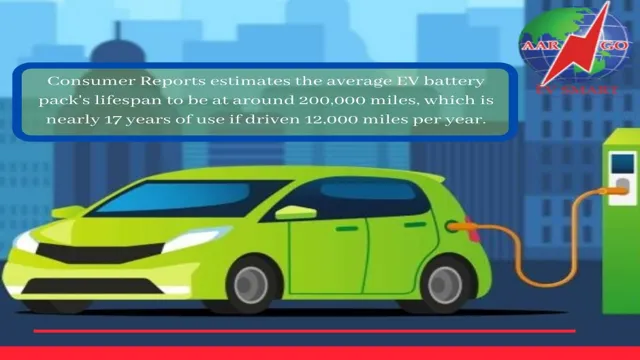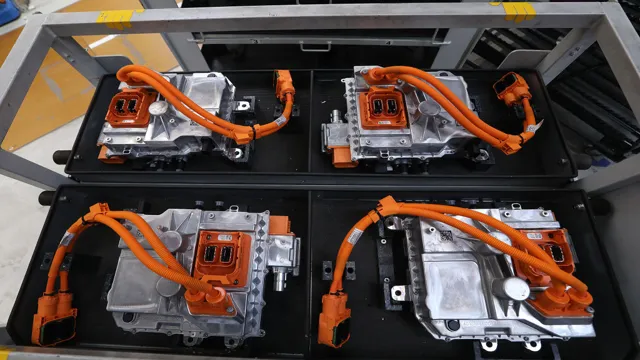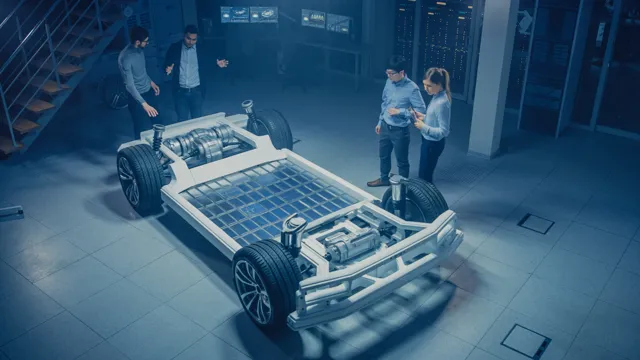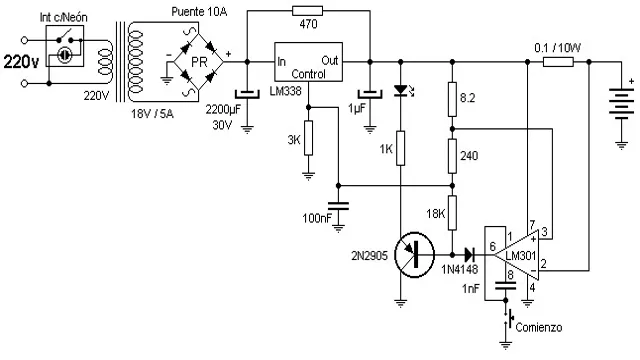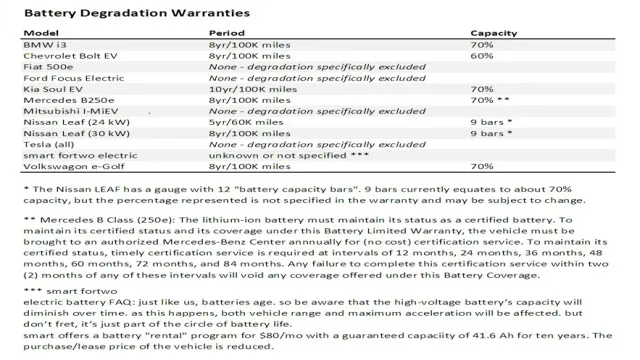Unveiling the Secret to Prolonging the Battery Lifespan of Your Electric Car
Electric cars have gained tremendous popularity over the years due to their impressive performance, eco-friendliness, and cost-effectiveness. However, one of the main concerns of electric car owners is the battery lifespan. With time, the performance of the battery will decrease, resulting in reduced range and longer charging times.
Fortunately, there are ways to extend the lifespan of your electric car’s battery and get the most out of your investment. In this blog post, we will explore some practical tips and techniques that can help extend the battery lifespan of your electric car and help you enjoy a hassle-free driving experience. So, sit back, relax, and read on to learn how to maximize the performance of your electric car.
Factors Affecting Battery Lifespan
When it comes to the lifespan of the battery in an electric car, there are a few key factors that come into play. Firstly, the type of battery used can have a significant impact on longevity. Lithium-ion batteries tend to be the most popular choice for electric cars as they have a longer lifespan than other types of batteries.
However, the quality and maintenance of the battery can also play a role. Proper charging and discharging practices can help prolong the life of the battery, as well as monitoring and addressing any abnormalities or issues that may arise. The temperature at which the battery operates can also affect its lifespan, with extreme heat or cold causing faster degradation.
Driving habits, such as frequent fast charging and rapid acceleration, can also contribute to wear and tear on the battery. Overall, the lifespan of an electric car battery can vary greatly depending on these factors, but with proper care and maintenance, it is possible to extend its lifespan significantly.
Temperature and Climate
Temperature and climate can significantly impact the lifespan of batteries. High temperatures can accelerate the chemical reactions inside the battery, leading to faster degradation of the electrodes. On the other hand, extremely low temperatures can cause the electrolyte inside the battery to freeze, which can damage the cell’s structure and reduce its capacity.
Additionally, exposure to extreme weather conditions, such as excessive humidity, can cause corrosion on the battery terminals, which can compromise the battery’s performance and ultimately lead to its failure. It’s important to store batteries in a cool, dry place and avoid exposing them to extreme temperatures or weather conditions. By doing so, you can extend the lifespan of your batteries and ensure that they function properly for your devices.
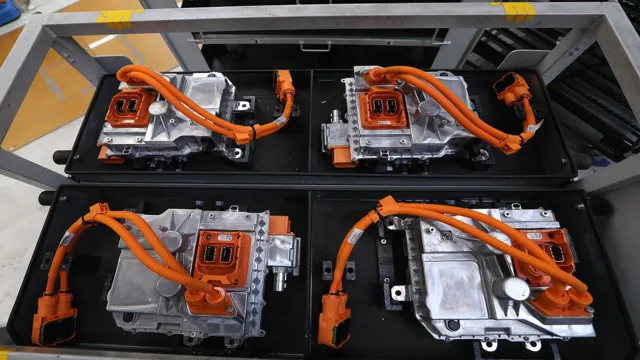
Driving and Charging Habits
When it comes to the lifespan of an electric car battery, the way you drive and charge your vehicle can greatly affect its longevity. One major factor that impacts battery health is frequently fast charging your car. Rapid charging generates heat, which can cause the battery to degrade over time.
Instead, it’s better to use slower charging methods whenever possible. Additionally, the way you drive can affect the battery’s lifespan. Accelerating and braking aggressively can put more stress on the battery, whereas driving at a steady pace can help preserve the battery’s health.
Finally, the temperature at which you store your electric car can also affect the battery’s lifespan. If possible, try to park your car in a place that’s not too hot or too cold. By developing healthy charging and driving habits, you can extend the lifespan of your battery and potentially save money in the long run.
Tips to Maximize Battery Lifespan
Electric car batteries have come a long way in recent years, but they still require careful management to maximize their lifespan. To make the most of your battery, make sure to pay attention to its temperature, as extreme heat or cold can have a major impact on its health. You should also avoid letting the battery drain completely, as this can put extra strain on its cells.
One way to avoid this is to set a lower limit for your car’s battery level, so that it never drops below a certain point. Additionally, try to avoid fast charging whenever possible, as this can generate a lot of heat and cause wear on the battery. Overall, with some careful attention and care, you can extend the lifespan of your electric car battery and get the most out of your vehicle.
Keep the Battery Charged
Keeping your phone’s battery charged is essential if you want it to last longer. However, charging your phone incorrectly could decrease battery lifespan, leading to a shorter battery life and reduced performance. To maximize your battery lifespan, always use the charger that comes with your phone.
Using generic chargers may overload the battery or cause overheating, which is not good for the battery. Also, avoid charging your phone to 100% all the time and letting it drain to 0%. Charging your phone between 40% and 80% can extend your battery lifespan by up to four times.
Additionally, try to avoid using your phone while it charges since this also produces heat, which can harm your phone’s battery. Lastly, keep it in mind that extreme temperatures can cause damage to your phone’s battery. Therefore, avoid exposing your phone to extreme hot or cold temperatures.
By following these tips, you can maximize your phone’s battery lifespan, saving you money on replacements and keeping your phone running smoothly for longer periods.
Avoid Extreme Temperatures
One of the easiest ways to extend the lifespan of your battery is to avoid exposing it to extreme temperatures. Prolonged exposure to very high or very low temperatures can cause significant damage to your battery and reduce its overall lifespan. For instance, exposing your smartphone battery to extreme heat or leaving it in a car on a hot day can cause the battery to degrade faster than usual.
In contrast, cold temperatures can cause the battery to drain faster, making it difficult to hold a charge. To prevent this, it is recommended that you store your electronics and devices in a cool, dry place and avoid leaving them in direct sunlight or near sources of heat. This simple tip can help you optimize your battery lifespan and keep your devices running smoothly for longer.
Regenerate Energy Through Braking
Regenerate Energy Through Braking – Tips to Maximize Battery Lifespan One of the best ways to keep your electric vehicle’s (EV) battery in top condition is to maximize the regeneration of energy through braking. Regenerative braking is the process where the vehicle’s kinetic energy is converted into electrical energy and stored in the battery. This not only helps to boost your car’s efficiency but also helps to extend the battery’s lifespan.
To maximize this process, it’s important to anticipate stops and slow down gradually rather than relying on sudden braking. This way, your car can easily recover the energy that would have been lost in the form of heat. Another tip is to use the lowest setting of your accelerator to avoid excessive acceleration, which means less braking.
This simple tip can significantly increase the distance you can travel on a single charge, thereby increasing your battery’s lifespan. So, the next time you hit the road, try to drive in a more relaxed way and keep these tips in mind to regenerate energy and extend your car’s battery life.
How Long Can Electric Car Batteries Last?
When it comes to electric cars, one of the most common questions that people have is how long the batteries will last. The truth is that it ultimately depends on a variety of factors, including the make and model of the vehicle, the type of battery used, and how often the car is driven. On average, however, most electric car batteries can last anywhere from 8 to 10 years or up to 100,000 miles, whichever comes first.
It’s important to note that battery life can be affected by many factors, including the climate, the way the vehicle is driven, and the maintenance schedule. Drivers can take certain steps to prolong their electric car battery lifespan, such as avoiding extreme temperatures and fast-charging the battery as little as possible. Overall, electric car batteries have come a long way in recent years, and they are now more durable and long-lasting than ever before, making them a great choice for environmentally conscious drivers.
Warranty and Degradation Rate
When it comes to electric cars, many people wonder how long they can expect their batteries to last. The answer depends on several factors, including the warranty and the degradation rate. Most electric car manufacturers offer warranties that range from 8 to 10 years, with some offering up to 15 years.
However, the degradation rate of the battery can vary, meaning that a battery with an 8-year warranty may degrade faster than another with the same warranty length. Additionally, factors such as driving habits, temperature, and the type of charger used can all affect the battery’s lifespan. It’s important to note that while degradation will occur over time, it doesn’t necessarily mean that the battery will cease to function completely.
Instead, it may simply experience a reduction in its maximum capacity. Ultimately, the lifespan of an electric car battery is hard to predict, but with proper care and maintenance, it’s possible to extend its life and get the most out of your vehicle’s battery.
Battery Replacement/Costs
Battery Replacement/Costs One of the most common concerns for electric car owners is the lifespan of the battery. The good news is that electric car batteries are designed to last a long time, with some manufacturers offering warranties of up to 8 years or 100,000 miles. However, the lifespan of the battery can vary depending on factors such as usage, climate, and maintenance.
It’s also important to note that the battery’s performance may degrade over time, meaning it may not hold a charge as well as it did when it was new. If you do need to replace your electric car battery, the cost can vary depending on the make and model of your vehicle. Some manufacturers offer replacement batteries for as low as $5,500, while others can cost up to $16,000.
However, it’s important to keep in mind that battery replacement is not typically necessary until well after the warranty period has expired. In fact, many electric car owners report never needing to replace their battery at all. Overall, if you take good care of your electric car’s battery and follow the manufacturer’s guidelines for maintenance and usage, it should last you for many years to come.
And if the time does come to replace the battery, the cost may not be as frightening as you initially thought. So don’t let battery life be a deterrent to purchasing an electric car – with proper care, it can be one of the most reliable and cost-effective choices on the market.
Conclusion: Battery Maintenance is Key
In conclusion, the battery lifespan of an electric car is a complex topic that requires an understanding of various factors such as the battery chemistry, charging habits, temperature, and even driving style. While it may seem like a daunting challenge to maintain a long-lasting battery, with proper care and attention, electric car owners can enjoy their eco-friendly rides for many years to come. So, remember, if you want to keep your EV’s battery going strong, treat it like you would a good friend – give it plenty of love, attention, and occasional rest when needed.
The result? You’ll have a reliable, powerful, and sustainable vehicle for generations to come!”
FAQs
What is the typical lifespan of an electric car battery?
The typical lifespan of an electric car battery is around 8-10 years or approximately 100,000 miles, depending on usage and care.
How can I extend the lifespan of my electric car battery?
You can extend your electric car battery lifespan by avoiding frequent fast charging, keeping the battery cool, and avoiding running the battery to empty frequently.
Can I replace my electric car battery?
Yes, you can replace an electric car battery. However, it can be expensive, so it’s important to take proper care of your battery to ensure its longevity.
Does driving an electric car in extreme temperatures affect the battery lifespan?
Yes, extreme temperatures can affect the battery lifespan of an electric car. Very high temperatures can degrade the battery faster, while very low temperatures can reduce the battery’s capacity temporarily.
